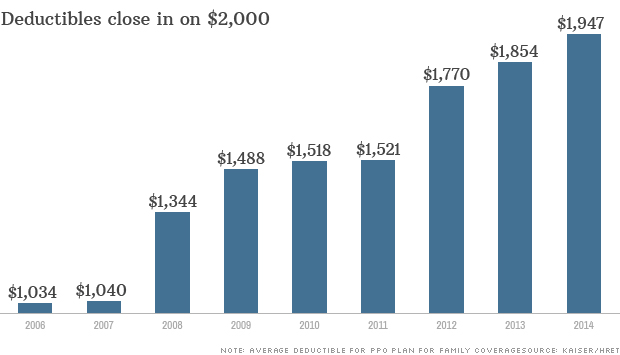Hospitals ask patients to pay upfront
NEW YORK (CNNMoney)
Get ready to whip out your credit card before you are wheeled into the operating room or undergo an MRI.
Hospitals are increasingly asking patients to pay for procedures either upfront or before they are discharged. That’s because Americans are shouldering a greater portion of their health care bills, and medical centers don’t want to get stuck with patients that can’t pay.
Traditionally, neither patients nor providers knew the exact price of procedures until after the insurer processed the charges. Now, however, new technology is allowing hospitals to determine the patient’s responsibility in advance of treatment.
Starting the cost conversation early is especially important now because patients are facing higher deductibles and larger payments for services. Some are surprised to find out that they have to fork over thousands of dollars before their insurance even kicks in, hospital administrators said.
The policies available on the Obamacare exchanges are hastening this trend. Many enrollees are opting for the bronze and silver plans, which often carry deductibles upwards of $5,000 and $2,000, respectively.
“The bronze plans are scaring a lot of administrators because the patient liability is so large,” said Debra Lowe, administrative director of revenue cycle at Ohio State University’s Wexner Medical Center. “Patients are unaware they have this high deductible.”
Related: Obamacare: Is a $2,000 deductible ‘affordable?’
Upfront payments aren’t usually required, but more hospitals are asking patients to settle the bill in advance. If patients can’t afford the charges, some hospitals place them into financial assistance programs, such as payment plans or low-interest loans. Others help them sign up for Medicaid or individual coverage on the Obamacare exchanges. Patients can still opt to wait until after the bill goes through their insurance.
“We are trying to minimize the after-service bill shock and get them into financial assistance or some other program for more affordable care,” said Andy Scianimanico, vice president for revenue cycle at Northwestern Memorial HealthCare, the parent company of Chicago’s largest hospital.
Related: 5 ways you pay more for health insurance
Northwestern started upfront financial counseling with patients in 2011 and has now expanded it to four departments, including surgery and imaging. It plans to implement it in all areas of the four-hospital network over the next two years.
Soaring deductibles have prompted hospitals to be more aggressive about collecting in advance. The average deductible for an individual employer-sponsored policy has soared to $1,217, up 47% from five years ago, according to the 2014 Kaiser Family Foundation/Health Research & Educational Trust report. For family policies, deductibles have soared 31% to $1,947.

Deductibles of $5,000 are the most common amount seen at Wexner Medical Center, said Lowe. It started requesting upfront payments in July and hopes to collect 75% of the charges ahead of time.
‘Settling the bill upfront also helps improve hospitals’ profitability, said David E. Williams, president of Health Business Group, a consulting firm for the healthcare industry. Providers are at least twice as likely to receive payment if they ask for it in advance. Also, chasing after patients who haven’t paid their bills is very costly.
Hospitals provided $46 billion in uncompensated care in 2012, or 6.1% of their total expenses, according to the American Hospital Association.
First Published: September 29, 2014: 8:40 AM ET


